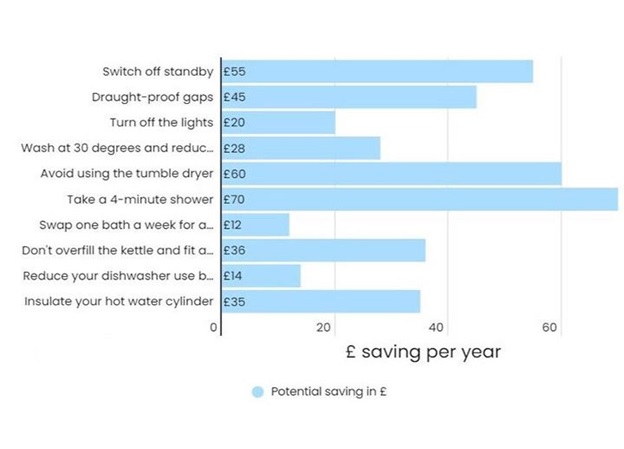Energy prices are constantly rising, and there is no sign of them coming down any time soon. Therefore, it is wise to save energy where possible to cut costs. Using less energy also reduces UK’s carbon footprint and helps it reach its net zero emissions target by 2050.
In this article, we list below a list of tips that you can use to reduce your energy costs. Most of the savings figures are taken from the Energy Saving Trust and based on a typical UK household energy consumption using the April 2022 energy price cap. This means the savings will be even more from October 2022, when the price cap will be higher.
Switch off appliances on standby mode
One of the easiest things you can do to reduce your electricity bill is to reduce your phantom load. A phantom load, also known as vampire load, is any electricity a device or appliance uses, even when switched off. Voice-activated devices and devices on standby mode continue to consume electricity even when not operating. The worst offenders of phantom loads are TVs, video game consoles, cable boxes, and audio systems. Turning them off at the plug can save you £ 55 a year.
Block draughts
You can use inexpensive draught-proofing strips around the frame to prevent warm air from escaping through gaps around windows and doors. They are readily available from any DIY store, easy to apply, and can save you around £ 25 a year.
Use LED bulbs
Not all light bulbs are the same. An LED bulb costs less than £ 3 to buy, lasts 25000 hours, costs £ 1.71 a year to run and uses up to 90% less energy than the traditional incandescents. In comparison, a halogen bulb’s lifetime is only 2000 hours and costs
£ 8.42 per year to run. Once you add up all the bulbs in your home, the savings are substantial.
Turn the lights off after use
Turning the lights off after use can save you another £ 20 per year.
Move furniture away from the radiators
It is important to allow heat to flow around the room effectively. If you place anything over or near your radiator, it will block the airflow causing it to discharge less heat and make the boiler work harder.
Wash a full load of clothes at 30 degrees
The appliance will use the same amount of energy whether it has a full or half load. Therefore, washing clothes with a full load is more cost-effective and less time-consuming. The savings are £ 19 yearly for modern machines and more on older versions.
It is also more cost-effective to wash clothes on a 30-degree cycle than on 40 or 60 degrees. This setting is adequate for most clothes that need washing. You can save up to £ 54 a year just by washing clothes on a 30-degree cycle. You may want to consider washing very dirty clothes at a higher temperature.
Use the dishwasher only when full
Since a dishwasher uses the same amount of energy and water, whether it is full or not, running it when it is full is a wiser choice. As it will run less often, it will consume less energy. Using a dishwasher just once a week can save you £ 14 a year, and you can save more by running it in energy-saving mode and at a lower temperature.
Avoid tumble dryer
Avoiding a tumble dryer to dry clothes can save you up to £ 60 a year. You can use a clothes liner outside your house when the weather is dry. On rainy days, you can dry clothes inside your home in a closed room, with a window open or a dehumidifier running to prevent dampness. Avoid drying them on a radiator, as it just makes the boiler work harder and consume more energy.
Invest in tumble dryer balls
If you must use a tumble dryer, then investing in tumble dryer balls is recommended. They work by creating air between the clothes, allowing them to dry quickly and saving you energy. They are inexpensive to buy at less than £ 10 for six and are readily available online.
Take a shower instead of a bath
Swapping just one bath for a four-minute shower can save you £ 12 every time. Be careful though, high-volume power showers running for five minutes can use more water than a bath, so this saving is based on a standard shower head.
Shower for four minutes or less
On average, 25% of a household’s energy bills are spent heating water. Keeping shower time down to four minutes or less can save a typical family around £ 70 a year. A shower timer or an alarm on your mobile can help you with that.
Fit a water-saving shower head
Water takes energy to heat; the less water you use, the less energy you use. Fitting a water-saving shower head can save you money on your energy bills as well as water bills if you have a water meter. A typical family can save up to £ 50 a year just by using a water-saving shower head which costs less than £ 10.
Fill your fridge and freezer with tap water bottles
It may sound strange, but your fridge and freezer consume more energy if they are less full. To make them use less energy, you may want to consider filling them with tap water bottles.
Defrost your fridge and freezer
Regularly defrosting your fridge and freezer keeps ice under control and everything working efficiently.
Don’t overfill the kettle
The more water you have in your kettle, the more time it takes to boil it. Therefore, it is smarter only to boil the required amount to save energy. You can save £ 16 a year just by not overfilling your kettle and boiling only the required amount of water.
Keep your oven closed
Keeping the oven closed during cooking prevents heat from escaping and uses less energy. Each time you open the door, it loses 25 degrees of heat. To prevent that heat loss, it is best to check on food using the oven window instead of opening the door.
Insulate your hot water cylinder
If your hot water cylinder is uninsulated, insulating it with a £19 hot water cylinder jacket can reduce heat loss by up to 75%. It is recommended that the jacket is at least 80mm thick and has a British Standard Kitemark on it for maximum results.
The table below, published by the Energy Saving Trust, shows some of the savings mentioned above. The savings figures are based on the April 2022 energy price cap and are likely to be higher when the price cap is revised in October 2022.

Sources:
https://energysavingtrust.org.uk/hub/quick-tips-to-save-energy/
https://www.britishgas.co.uk/the-source/greener-living/energy-saving-habits.html
https://octopus.energy/blog/energy-saving-tips/
https://www.nidirect.gov.uk/articles/energy-efficiency-tips
https://www.shellenergy.co.uk/energy/energy-saving
https://www.ebay.co.uk/b/Water-Saving-Shower-Head/71282/bn_7023504611
https://www.wickes.co.uk/Wickes-British-Standard-Hot-Water-Cylinder-Jacket—457-x-1066mm-PK4/p/210203

